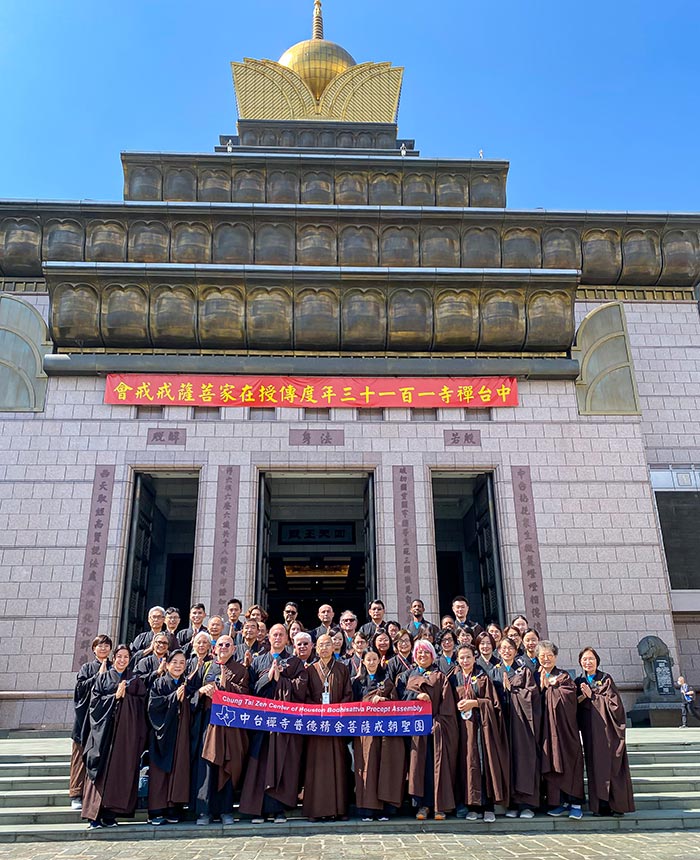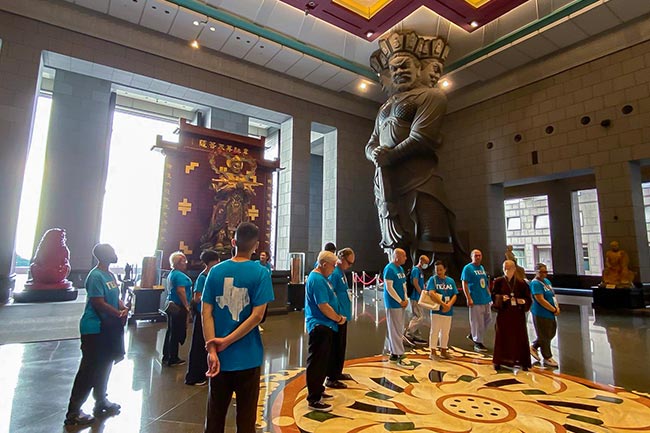


Eric Chu (Chuan Zong) – Chung Tai Zen Center of Houston, USA
This past fall, I had the extraordinary blessing of traveling to Chung Tai Chan Monastery in Puli, Taiwan to ask for the transmission of the bodhisattva precepts. I feel especially fortunate to have received the precepts with over four thousand diligent and like-minded buddhist practitioners. It is not lost on me the incredible causes and conditions that allowed for such a precious opportunity to arise, and I am eternally grateful to all the shifus and volunteers at Chung Tai for planning this event.
Originally, going back to Taiwan and taking the bodhisattva precepts was completely off my radar this year. Despite having grown up in a Buddhist family, I realized I seldom gave rise to the thought of making great vows, especially those related to relieving the sufferings of other sentient beings. Even though I had been a vegetarian since my elementary school days, I recall my dietary choice being loosely based on it being convenient at home and at restaurants for my vegetarian family and less so about cultivating great benevolence towards animals. I must have recited the Four Great Vows an innumerable number of times since my first youth class and yet I never gave serious thought to fulfilling them when it came to alleviating the sufferings of others. At the time, I simply viewed the precepts as a way to live life virtuously, not so much as a vehicle for me to help other sentient beings.

When I did raise the thought of benefitting other sentient beings, I realized that I was wrongfully selective with whom I wanted to dedicate merits to. For example, after reading several books regarding the continual dispossession of land from the Palestinians since the 1948 Nakba and having seen some of the painful photos of the destruction of Gaza on social media, I felt immensely enraged towards Israel and in turn, only wrote memorial tablets for Palestinians in ceremonies and scoffed at the idea of ever writing ones for Israelis. However, as I began listening to the series of lectures given by the Venerable Masters in Taiwan during the bodhisattva precept ceremony, I learned and contemplated what it means to be a bodhisattva, and reviewed some of the content of sutras I have recited before, I realized that my view was limited and inconsistent with what it means to be a true bodhisattva. After all, if I truly believed that each and every sentient being is endowed with an innate buddha nature, I should do my absolute best to help sentient beings of all forms and karmas to overcome their ignorance and achieve ultimate liberation. My selective compassion, while born of genuine empathy, revealed my attachment to dualistic thinking—categorizing beings as ''good'' or ''evil'' rather than seeing their innate buddha nature. I was deeply ignorant and became too attached to their current form and it subsequently limited my compassion. Instead of attaching to such a world view, I should strive to raise a mind of a bodhisattva and commit myself to liberating all sentient beings. Kshitigarbha Bodhisattva repeatedly returns to hell realms to rescue sentient beings, despite their egregious karmas. Similarly, Chung Tai Chan Monastery hosts Great Meng Shan Food Bestowal Service as a way for the beings in hell and the realm of hungry ghosts to gain blessings and ascend to a higher destiny. These extraordinary acts of selfless compassion reminded me that true benevolence is unconditional. It transcends personal biases and extends even to those who seem furthest from liberation.
In reflecting on my journey of taking the bodhisattva precepts, I am filled with a sense of humility and gratitude for the teachings that have reshaped my understanding of compassion. This experience has been a transformative reminder that true compassion is not selective but all-encompassing and it transcends the boundaries of our own judgments and attachments. It has pushed me to continually examine my thoughts and actions, inspiring me to emulate the great vows and selflessness of the bodhisattvas. The precepts have become more than a guide for personal purity; they are now a call to action that urges me to see the buddha nature in all sentient beings and commit wholeheartedly to their liberation. I am grateful for this opportunity to learn Buddhadharma and I now have a deeper aspiration to embody the boundless compassion that defines the Bodhisattva Way.
A Selfless Resolve Sets off a Bright Journey